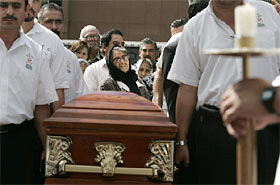Amid ongoing domestic debates focusing on the likelihood of a military incursion by Turkey into northern Iraq to stop infiltrations by PKK terrorists, a senior Iraqi Kurdish official says the world will not allow such an action, claiming Turkish tanks and panzers cannot cross into the north. Safin Dizai, a senior official from the Iraqi Kurdistan Democratic Party (KDP) and a close aide to Iraqi Kurdish leader Massoud Barzani, underlined that Turkish tanks would not be allowed to cross into northern Iraq, Turkish news reports said yesterday.
Dizai pointed to the ongoing domestic debates in Turkey about a possible cross-border operation to crack down on the outlawed Kurdistan Workers' Party (PKK) camps based in northern Iraq in the face of ongoing attacks inside the country. Dizai admitted that Turkey and the Iraqi Kurdish administration in the north were not currently on friendly terms and underlined Turkey would be unable to get its soldiers past the Habur border gate and to the northern Iraqi city of Kirkuk. The Turkish military says a cross-border operation into northern Iraq is needed to clamp down on PKK bases and to stop the infiltration of the PKK terrorists armed with weapons and explosives intending to carry out attacks in Turkey.
Over the weekend, Turkish Foreign Minister Abdullah Gül held a telephone conversation with U.S. Secretary of State Condoleezza Rice. Gül told Rice that the Turkish public was running out of patience due to the ongoing attacks in eastern Turkey, urging Washington to take urgent and effective measures to stop terrorist infiltrations from northern Iraq, reported the Anatolia news agency. During the conversation, Rice expressed the U.S. administration's dismay stemming from the killings of many civilians and soldiers in clashes with the PKK. But she did not touch upon the likelihood of a military incursion into northern Iraq by the Turkish army. She only said the United States was siding with Turkey in the fight against terrorism and assured that Washington would increase cooperation with Turkey in that respect, Anatolia news agency reported.
Speaking to reporters on Saturday, Gül said many political leaders from different countries called him and condemned last week's terrorist attack in the center of the Turkish capital, adding that his telephone conversation with Rice was in that regard. Public pressure on the government to step up the fight against the PKK mounted after a suicide bomber, who authorities believe was a PKK member, blew himself up at a busy shopping center in downtown Ankara on Tuesday, killing six people and wounding 121.
Asked whether a cross-border operation was discussed during their conversation, Gül said, "We make decisions about these issues by ourselves; we don't talk about it with others," Anatolia news agency reported.In a televised interview last week, Gül said Turkey has run out of patience over the safe haven the PKK enjoys in northern Iraq but added there were no immediate plans for a cross-border military operation into the region. He also dismissed suggestions of any disagreement between the government and the army on the issue, saying that Parliament and the government would certainly support any action, any operation that would yield results. Gül added, however, that there was no preparation at the moment for the government to seek parliamentary authorization to send soldiers into northern Iraq.
Washington has warned Ankara against a cross-border operation in northern Iraq, wary that such a move may destabilize a relatively peaceful region in the conflict-torn country and fuel tensions between Turkey and the Iraqi Kurds, a staunch U.S. ally.
|
 An antique beer mug presented to French President Jacques Chirac as an EU going-away present has drawn criticism from EU-hopeful Turkey for reportedly depicting an 18th century Ottoman defeat by the French.
An antique beer mug presented to French President Jacques Chirac as an EU going-away present has drawn criticism from EU-hopeful Turkey for reportedly depicting an 18th century Ottoman defeat by the French. A nice depiction of Trafalgar probably wouldn't have made it Jacque's favorite souvenir. And I can't see the Prussians giving him a mug depicting Austerlitz. It was probably the Turks, by default.
A nice depiction of Trafalgar probably wouldn't have made it Jacque's favorite souvenir. And I can't see the Prussians giving him a mug depicting Austerlitz. It was probably the Turks, by default. It was given to Chirac as a retirement gift by German Chancellor Angela Merkel at celebrations of the EU's 50th anniversary over the weekend. Merkel is opposed to full membership for Turkey and has instead advocated a special partnership with the sizeable mainly Muslim country.
It was given to Chirac as a retirement gift by German Chancellor Angela Merkel at celebrations of the EU's 50th anniversary over the weekend. Merkel is opposed to full membership for Turkey and has instead advocated a special partnership with the sizeable mainly Muslim country.
 Turkey extended condolences to the Catholic world for an Italian priest slain by a teenage assailant while praying in his church in the Black Sea province of Trabzon, as the cleric was laid to rest in a ceremony in Rome. There can be no religious, philosophical or humane explanation for the murder of a man of faith in a house of worship, Interior Minister Abdülkadir Aksu told a press conference in Trabzon, where Father
Turkey extended condolences to the Catholic world for an Italian priest slain by a teenage assailant while praying in his church in the Black Sea province of Trabzon, as the cleric was laid to rest in a ceremony in Rome. There can be no religious, philosophical or humane explanation for the murder of a man of faith in a house of worship, Interior Minister Abdülkadir Aksu told a press conference in Trabzon, where Father